论语-学而篇一中英文对照
- 格式:pdf
- 大小:202.45 KB
- 文档页数:2
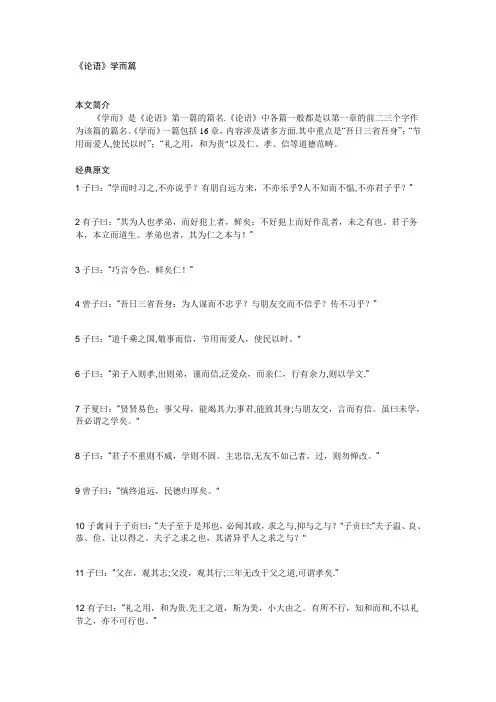
《论语》学而篇本文简介《学而》是《论语》第一篇的篇名.《论语》中各篇一般都是以第一章的前二三个字作为该篇的篇名。
《学而》一篇包括16章,内容涉及诸多方面.其中重点是“吾日三省吾身”;“节用而爱人,使民以时”;“礼之用,和为贵"以及仁、孝、信等道德范畴。
经典原文1子曰:“学而时习之,不亦说乎?有朋自远方来,不亦乐乎?人不知而不愠,不亦君子乎?”2有子曰:“其为人也孝弟,而好犯上者,鲜矣;不好犯上而好作乱者,未之有也。
君子务本,本立而道生。
孝弟也者,其为仁之本与!”3子曰:“巧言令色,鲜矣仁!”4曾子曰:“吾日三省吾身:为人谋而不忠乎?与朋友交而不信乎?传不习乎?”5子曰:“道千乘之国,敬事而信,节用而爱人,使民以时。
"6子曰:“弟子入则孝,出则弟,谨而信,泛爱众,而亲仁,行有余力,则以学文.”7子夏曰:“贤贤易色;事父母,能竭其力;事君,能致其身;与朋友交,言而有信。
虽曰未学,吾必谓之学矣。
"8子曰:“君子不重则不威,学则不固。
主忠信,无友不如己者,过,则勿惮改。
”9曾子曰:“慎终追远,民德归厚矣。
"10子禽问于子贡曰:“夫子至于是邦也,必闻其政,求之与,抑与之与?"子贡曰:“夫子温、良、恭、俭、让以得之。
夫子之求之也,其诸异乎人之求之与?"11子曰:“父在,观其志;父没,观其行;三年无改于父之道,可谓孝矣.”12有子曰:“礼之用,和为贵.先王之道,斯为美,小大由之。
有所不行,知和而和,不以礼节之,亦不可行也。
”13有子曰:“信近于义,言可复也。
恭近于礼,远耻辱也.因不失其亲,亦可宗也。
"14子曰:“君子食无求饱,居无求安,敏于事而慎于言,就有道而正焉.可谓好学也已。
”15子贡曰:“贫而无谄,富而无骄,何如?”子曰:“可也.未若贫而乐,富而好礼者也.”子贡曰:“《诗》云:‘如切如磋,如琢如磨’,其斯之谓与?"子曰:“赐也,始可与言《诗》已矣,告诸往而知来者。
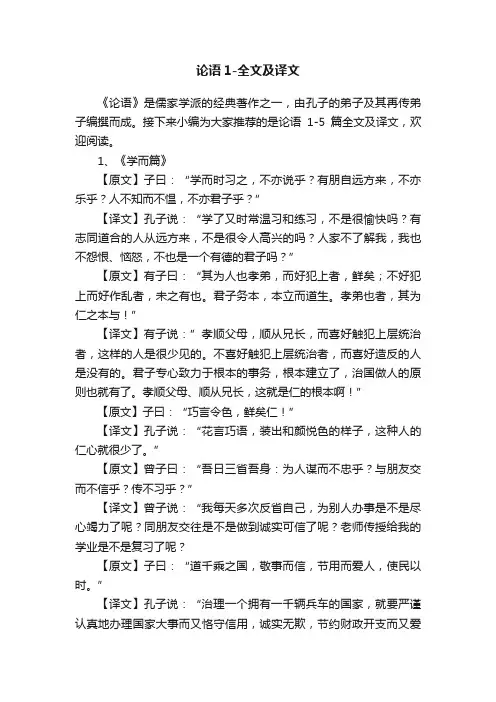
论语1-全文及译文《论语》是儒家学派的经典著作之一,由孔子的弟子及其再传弟子编撰而成。
接下来小编为大家推荐的是论语1-5篇全文及译文,欢迎阅读。
1、《学而篇》【原文】子曰:“学而时习之,不亦说乎?有朋自远方来,不亦乐乎?人不知而不愠,不亦君子乎?”【译文】孔子说:“学了又时常温习和练习,不是很愉快吗?有志同道合的人从远方来,不是很令人高兴的吗?人家不了解我,我也不怨恨、恼怒,不也是一个有德的君子吗?”【原文】有子曰:“其为人也孝弟,而好犯上者,鲜矣;不好犯上而好作乱者,未之有也。
君子务本,本立而道生。
孝弟也者,其为仁之本与!”【译文】有子说:”孝顺父母,顺从兄长,而喜好触犯上层统治者,这样的人是很少见的。
不喜好触犯上层统治者,而喜好造反的人是没有的。
君子专心致力于根本的事务,根本建立了,治国做人的原则也就有了。
孝顺父母、顺从兄长,这就是仁的根本啊!”【原文】子曰:“巧言令色,鲜矣仁!”【译文】孔子说:“花言巧语,装出和颜悦色的样子,这种人的仁心就很少了。
”【原文】曾子曰:“吾日三省吾身:为人谋而不忠乎?与朋友交而不信乎?传不习乎?”【译文】曾子说:“我每天多次反省自己,为别人办事是不是尽心竭力了呢?同朋友交往是不是做到诚实可信了呢?老师传授给我的学业是不是复习了呢?【原文】子曰:“道千乘之国,敬事而信,节用而爱人,使民以时。
”【译文】孔子说:“治理一个拥有一千辆兵车的国家,就要严谨认真地办理国家大事而又恪守信用,诚实无欺,节约财政开支而又爱护官吏臣僚,役使百姓要不误农时”。
【原文】子曰:“弟子入则孝,出则弟,谨而信,泛爱众,而亲仁,行有余力,则以学文。
”【译文】孔子说:“弟子们在父母跟前,就孝顺父母;出门在外,要顺从师长,言行要谨慎,要诚实可信,寡言少语,要广泛地去爱众人,亲近那些有仁德的人。
这样躬行实践之后,还有余力的话,就再去学习文献知识。
”【原文】子夏曰:“贤贤易色;事父母,能竭其力;事君,能致其身;与朋友交,言而有信。
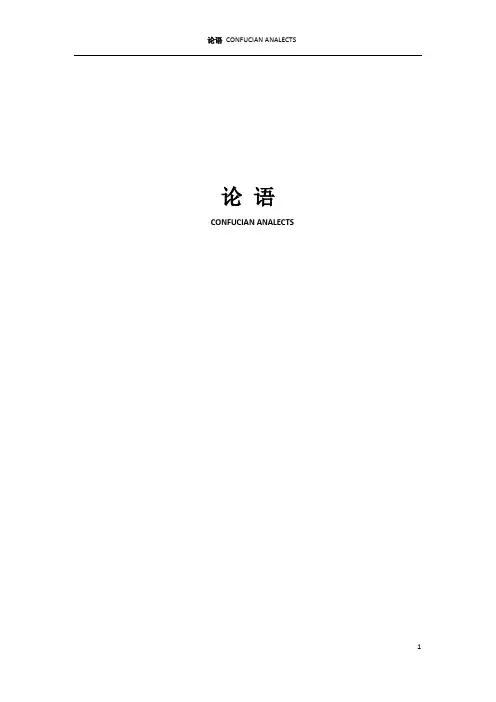
论语 CONFUCIAN ANALECTS学而第一『⒈1』子曰:“学而时习之,不亦说乎?有朋自远方来,不亦乐乎?人不知而不愠,不亦君子乎?”The Master said: "Is it not pleasant to learn with a constant perseverance and application? "Is it not delightful to have friends coming from distant quarters? "Is he not a man of complete virtue, who feels no discomposure though men may take no note of him?"『⒈2』有子曰:“其为人也孝弟,而好犯上者,鲜矣;不好犯上,而好作乱者,未之有也。
君子务本,本立而道生。
孝弟也者,其为仁之本与!”The philosopher Yu said, "They are few who, being filial and fraternal, are fond of offending against their superiors. There have been none, who, not liking to offend against their superiors, have been fond of stirring up confusion. "The superior man bends his attention to what is radical. That being established, all practical courses naturally grow up. Filial piety and fraternal submission,-are they not the root of all benevolent actions?"『⒈3』子曰:“巧言令色,鲜矣仁!”The Master said, "Fine words and an insinuating appearance are seldom associated with true virtue."『⒈4』曾子曰:“吾日三省吾身——为人谋而不忠乎?于朋友交而不信乎?传不习乎?”The philosopher Tsang said, "I daily examine myself on three points:-whether, in transacting business for others, I may have been not faithful;-whether, in intercourse with friends, I may have been not sincere;-whether I may have not mastered and practiced the instructions of my teacher."『⒈5』子曰:“道千乘之国,敬事而信,节用而爱人,使民以时。
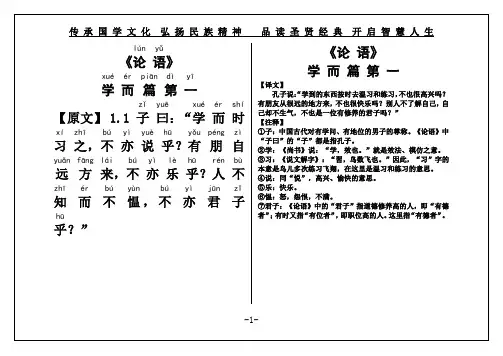
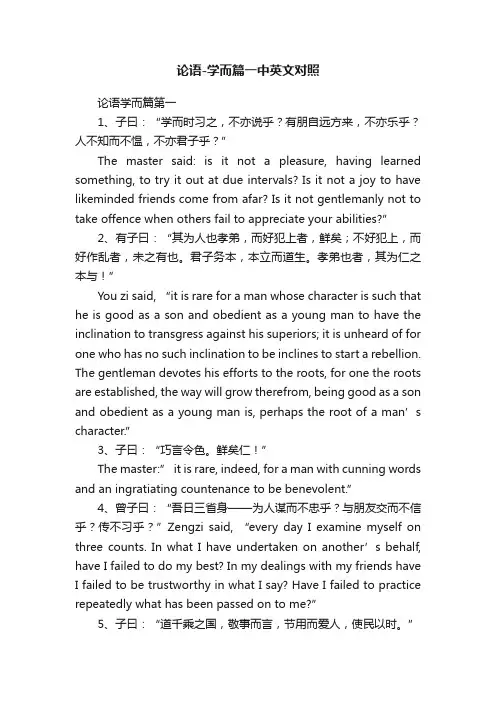
论语-学而篇一中英文对照论语学而篇第一1、子曰:“学而时习之,不亦说乎?有朋自远方来,不亦乐乎?人不知而不愠,不亦君子乎?”The master said: is it not a pleasure, having learned something, to try it out at due intervals? Is it not a joy to have likeminded friends come from afar? Is it not gentlemanly not to take offence when others fail to appreciate your abilities?”2、有子曰:“其为人也孝弟,而好犯上者,鲜矣;不好犯上,而好作乱者,未之有也。
君子务本,本立而道生。
孝弟也者,其为仁之本与!”You zi said, “it is rare for a man whose character is such that he is good as a son and obedient as a young man to have the inclination to transgress against his superiors; it is unheard of for one who has no such inclination to be inclines to start a rebellion. The gentleman devotes his efforts to the roots, for one the roots are established, the way will grow therefrom, being good as a son and obedient as a young man is, perhaps the root of a man’s character.”3、子曰:“巧言令色。
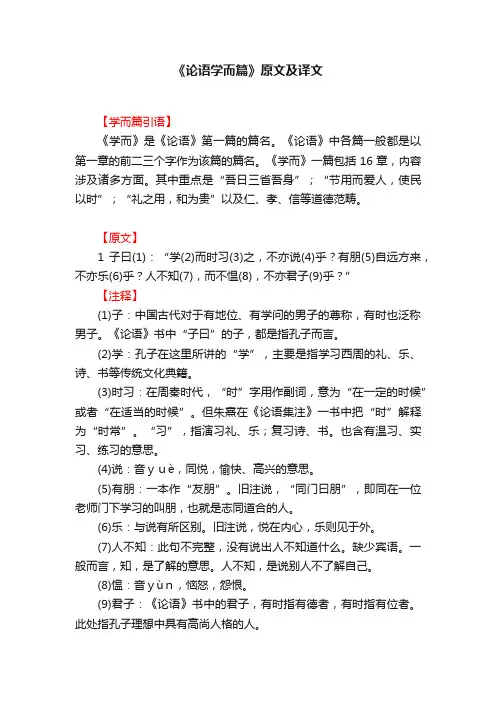
《论语学而篇》原文及译文【学而篇引语】《学而》是《论语》第一篇的篇名。
《论语》中各篇一般都是以第一章的前二三个字作为该篇的篇名。
《学而》一篇包括16章,内容涉及诸多方面。
其中重点是“吾日三省吾身”;“节用而爱人,使民以时”;“礼之用,和为贵”以及仁、孝、信等道德范畴。
【原文】1 子曰(1):“学(2)而时习(3)之,不亦说(4)乎?有朋(5)自远方来,不亦乐(6)乎?人不知(7),而不愠(8),不亦君子(9)乎?”【注释】(1)子:中国古代对于有地位、有学问的男子的尊称,有时也泛称男子。
《论语》书中“子曰”的子,都是指孔子而言。
(2)学:孔子在这里所讲的“学”,主要是指学习西周的礼、乐、诗、书等传统文化典籍。
(3)时习:在周秦时代,“时”字用作副词,意为“在一定的时候”或者“在适当的时候”。
但朱熹在《论语集注》一书中把“时”解释为“时常”。
“习”,指演习礼、乐;复习诗、书。
也含有温习、实习、练习的意思。
(4)说:音yuè,同悦,愉快、高兴的意思。
(5)有朋:一本作“友朋”。
旧注说,“同门曰朋”,即同在一位老师门下学习的叫朋,也就是志同道合的人。
(6)乐:与说有所区别。
旧注说,悦在内心,乐则见于外。
(7)人不知:此句不完整,没有说出人不知道什么。
缺少宾语。
一般而言,知,是了解的意思。
人不知,是说别人不了解自己。
(8)愠:音yùn,恼怒,怨恨。
(9)君子:《论语》书中的君子,有时指有德者,有时指有位者。
此处指孔子理想中具有高尚人格的人。
【译文】孔子说:“学了又时常温习和练习,不是很愉快吗?有志同道合的人从远方来,不是很令人高兴的吗?人家不了解我,我也不怨恨、恼怒,不也是一个有德的君子吗?”【评析】宋代著名学者朱熹对此章评价极高,说它是“入道之门,积德之基”。
本章这三句话是人们非常熟悉的。
历来的解释都是:学了以后,又时常温习和练习,不也高兴吗等等。
三句话,一句一个意思,前后句子也没有什么连贯性。
![论语中英文对照[1]](https://uimg.taocdn.com/59289e7c9b6648d7c0c74614.webp)
CONFUCIAN ANALECTS论语中英文对照[1]译者James Legge學而第一BOOK I. HSIO R.【第一章】【一節】子曰、學而時習之、不亦說乎。
【二節】有朋自遠方來、不亦樂乎。
【三節】人不知而不慍、不亦君子乎。
CHAPTER I. 1. The Master said, ''Is it not pleasant to learn with a constant perseverance and application?2. ''Is it not delightful to have friends coming from distant quarters?''3. ''Is he not a man of complete virtue, who feels no discomposure though men may take no note of him?''[ˌdɪskəm'pəʊʒə(r)] 心乱不安【第二章】【一節】有子曰、其為人也孝弟、而好犯上者鮮矣、不好犯上、而好作亂者、未之有也。
【二節】君子務本、本立、而道生、孝弟也者、其為仁之本與。
CHAP. II. 1. The philosopher Yu said, ''They are few who, being filial and fraternal, are fond of offending against their superiors. There have been none, who, not liking to offend against their superiors, have been fond of stirring up confusion.2. ''The superior man bends his attention to what is radical. That being established, all practical courses naturally grow up. Filial piety and fraternal submission!-- are they not the root of all benevolent actions?''【第三章】子曰、巧言令色、鮮矣仁。
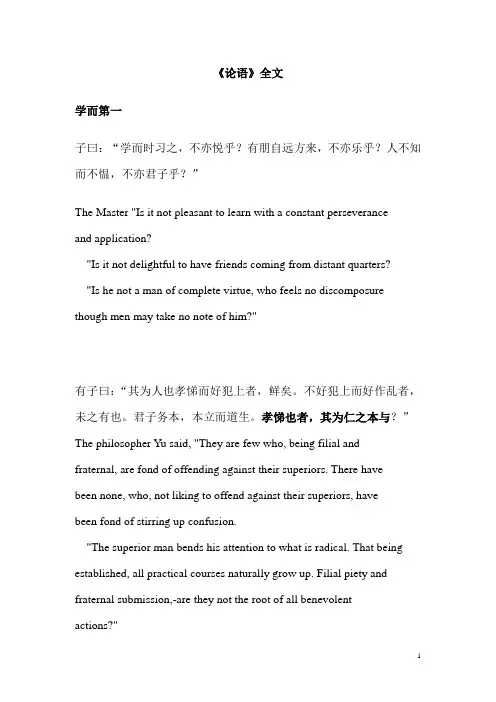
《论语》全文学而第一子曰:“学而时习之,不亦悦乎?有朋自远方来,不亦乐乎?人不知而不愠,不亦君子乎?”The Master "Is it not pleasant to learn with a constant perseveranceand application?"Is it not delightful to have friends coming from distant quarters?"Is he not a man of complete virtue, who feels no discomposure though men may take no note of him?"有子曰:“其为人也孝悌而好犯上者,鲜矣。
不好犯上而好作乱者,未之有也。
君子务本,本立而道生。
孝悌也者,其为仁之本与?”The philosopher Yu said, "They are few who, being filial and fraternal, are fond of offending against their superiors. There havebeen none, who, not liking to offend against their superiors, havebeen fond of stirring up confusion."The superior man bends his attention to what is radical. That being established, all practical courses naturally grow up. Filial piety and fraternal submission,-are they not the root of all benevolent actions?"子曰:“巧言令色,鲜矣仁。
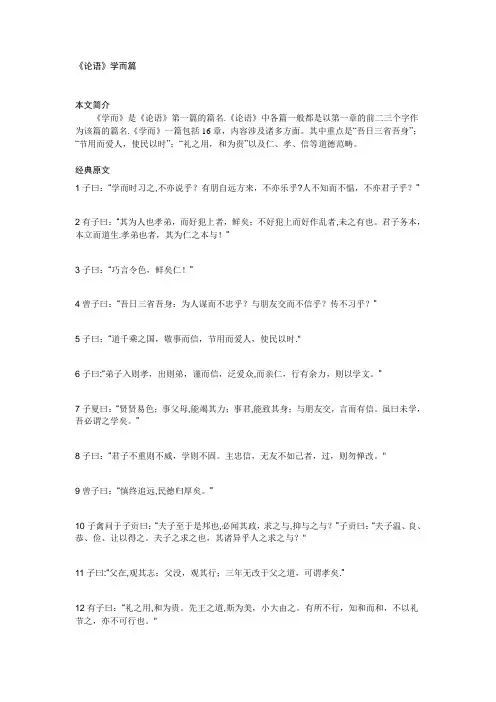
《论语》学而篇本文简介《学而》是《论语》第一篇的篇名.《论语》中各篇一般都是以第一章的前二三个字作为该篇的篇名.《学而》一篇包括16章,内容涉及诸多方面。
其中重点是“吾日三省吾身”;“节用而爱人,使民以时”;“礼之用,和为贵”以及仁、孝、信等道德范畴。
经典原文1子曰:“学而时习之,不亦说乎?有朋自远方来,不亦乐乎?人不知而不愠,不亦君子乎?”2有子曰:“其为人也孝弟,而好犯上者,鲜矣;不好犯上而好作乱者,未之有也。
君子务本,本立而道生.孝弟也者,其为仁之本与!”3子曰:“巧言令色,鲜矣仁!”4曾子曰:“吾日三省吾身:为人谋而不忠乎?与朋友交而不信乎?传不习乎?”5子曰:“道千乘之国,敬事而信,节用而爱人,使民以时."6子曰:“弟子入则孝,出则弟,谨而信,泛爱众,而亲仁,行有余力,则以学文。
”7子夏曰:“贤贤易色;事父母,能竭其力;事君,能致其身;与朋友交,言而有信。
虽曰未学,吾必谓之学矣。
”8子曰:“君子不重则不威,学则不固。
主忠信,无友不如己者,过,则勿惮改。
"9曾子曰:“慎终追远,民德归厚矣。
”10子禽问于子贡曰:“夫子至于是邦也,必闻其政,求之与,抑与之与?”子贡曰:“夫子温、良、恭、俭、让以得之。
夫子之求之也,其诸异乎人之求之与?"11子曰:“父在,观其志;父没,观其行;三年无改于父之道,可谓孝矣.”12有子曰:“礼之用,和为贵。
先王之道,斯为美,小大由之。
有所不行,知和而和,不以礼节之,亦不可行也。
"13有子曰:“信近于义,言可复也.恭近于礼,远耻辱也.因不失其亲,亦可宗也."14子曰:“君子食无求饱,居无求安,敏于事而慎于言,就有道而正焉.可谓好学也已。
”15子贡曰:“贫而无谄,富而无骄,何如?”子曰:“可也。
未若贫而乐,富而好礼者也。
”子贡曰:“《诗》云:‘如切如磋,如琢如磨’,其斯之谓与?”子曰:“赐也,始可与言《诗》已矣,告诸往而知来者。
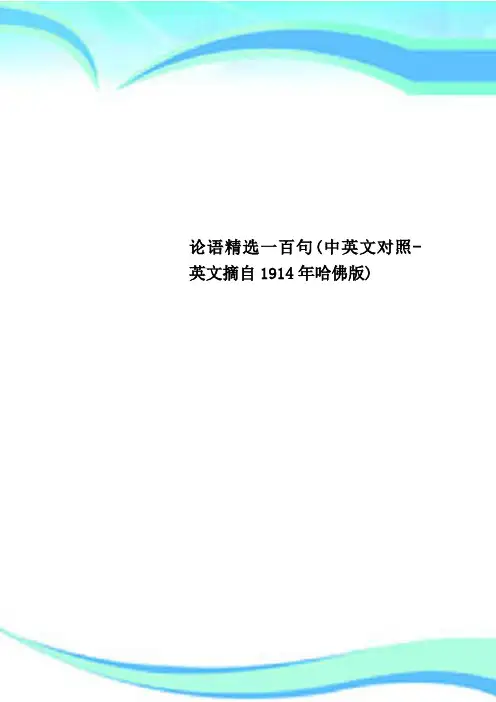
论语精选一百句(中英文对照-英文摘自1914年哈佛版)————————————————————————————————作者:————————————————————————————————日期:論語精選一百句論語學而篇第一一、子曰:「學而時習之,不亦說乎?有朋自遠方來,不亦樂乎?人不知而不慍,不亦君子乎?」THE MASTER said: “In learning and straightway practising is there not pleasure also? When friends gather round from afar do we not rejoice? Whom lack of fame cannot vex is not he a gentleman?”二、子曰:「巧言令色,鮮矣仁。
」The Master said: “Honeyed words and flattering looks seldom speak of love.”三、子曰:「君子食無求飽,居無求安,敏於事而慎於言,就有道而正焉:可謂好學也已。
」The Master said: “A gentleman who is not a greedy eater, nor a lover of ease at home, who is earnest in deed and careful of speech, who seeks the righteous and profits by them, may be called fond of learning.”四、子曰:「不患人之不己知,患不知人也。
」The Master said: “Not to be known should not grieve you: grieve that ye know not men.”五、曾子曰:「吾日三省吾身:為人謀,而不忠乎?與朋友交,而不信乎?傳,不習乎?」Tseng-tzu said: “Thrice daily I ask myself: ‘Have I been unfaithful in dealing for others? Have I been untrue to friends? Do I prac tise what I preach?’”六、曾子曰:「慎終追遠,民德歸厚矣。

《论语》译文中英对照学而第一篇:孔子说:【学习以后,能在一定的时候温习它,不也感到很高兴吗?有志同道合的人从远方来,不也感到很快乐吗?别人不理解我,我却不埋怨,不也是以为有教养的君子吗?】Confucius said: [after you studies, you review don’t you also very happy? There are like-minded people from afar, not also feel very happy? Other people don't understand me, but I don't complain, don't think educated gentleman, too?]有子说:【如果一个人能够孝顺父母,尊敬兄长,却喜欢冒犯上级,这种情况是很少有的;不喜欢冒犯上级,却喜欢造反作乱,这种人是从来没有过的。
君子专心致志是最根本的工作,基本的东西有了,道就由此产生了。
孝敬父母,尊敬兄长,这应该是仁爱的根本吧!】YOUZI said:[ If a person is able to filial piety, respect elder brother, but like to offend superior, this situation is rare; Do not like to offend superior, but like to revolt of the crisis, this kind of person is never. Gentleman's devotion is the fundamental work, basic things, the resulting word. Filial piety parents and respect older brother, this should be the root of the love!!!!]孔子说:【花言巧语,面目伪善,这样的人,道德是不可能多的。
《论语》学而第一带拼音和译文
论语学而第一
> 子曰:“学而时之,不亦说乎?有朋自远方来,不亦乐乎?
人不知而不愠,不亦君子乎?
> 不患莫己知,求人不倦。
”
在《论语》学而篇的第一章,孔子说:“研究并适时复,难道
不喜欢吗?有朋友从远方来,难道不快乐吗?被人不知道而不生气,难道不是君子吗?不嫌弃自己无人知之事,求人不厌烦。
”
这里,孔子强调了三个重要的观点。
首先,他提出了研究的重
要性,并强调每个人应该适时地复所学的知识。
通过不断研究和复,我们能够深化对知识的理解和应用,并最终达到对知识的掌握和运用。
其次,孔子强调了朋友的重要性。
他认为有朋友远道而来是一
件令人快乐的事情。
朋友之间可以互相交流、分享心得,从而得到
更多的启发和提升。
朋友的存在可以帮助我们更好地成长与发展。
最后,孔子谈到了君子的品质。
他认为一个君子应该能够不被
别人的无知所困扰,保持谦虚和宽容的态度。
同时,君子也应该能
够欣然接受求助和指导,不厌倦地向他人请教。
通过这句话,我们能够看出孔子对研究、人际关系和君子风范
的重视。
他强调了研究的重要性,并且提醒人们要善于与他人交流
和分享。
同时,他也强调了作为一个君子应该具备的品质,包括谦虚、宽容和勇于求教。
总结来说,《论语》学而篇第一章中的这句话提醒着我们,在
学习的道路上,应该保持谦逊、不倦,并且善于与他人交流和学习。
只有这样,我们才能够更好地成长与发展。
论语学而篇的原文及翻译论语学而篇的原文及翻译《论语》是儒家学派的经典著作之一,由孔子的弟子及其再传弟子编撰而成。
下面是小编为大家搜集整理出来的有关于论语学而篇的原文及翻译,希望可以帮助到大家!【本篇引语】《学而》是《论语》第一篇的篇名。
《论语》中各篇一般都是以第一章的前二三个字作为该篇的篇名。
《学而》一篇包括16章,内容涉及诸多方面。
其中重点是吾日三省吾身;节用而爱人,使民以时;礼之用,和为贵以及仁、孝、信等道德范畴。
【原文】11 子曰(1):学(2)而时习(3)之,不亦说(4)乎?有朋(5)自远方来,不亦乐(6)乎?人不知(7),而不愠(8),不亦君子(9)乎?【注释】(1)子:中国古代对于有地位、有学问的男子的尊称,有时也泛称男子。
《论语》书中子曰的子,都是指孔子而言。
(2)学:孔子在这里所讲的学,主要是指学习西周的礼、乐、、书等传统文化典籍。
(3)时习:在周秦时代,时字用作副词,意为在一定的时候或者在适当的时候。
但朱熹在《论语集注》一书中把时解释为时常。
习,指演习礼、乐;复习诗、书。
也含有温习、实习、练习的意思。
(4)说:音yuè,同悦,愉快、高兴的意思。
(5)有朋:一本作友朋。
旧注说,同门曰朋,即同在一位老师门下学习的叫朋,也就是志同道合的人。
(6)乐:与说有所区别。
旧注说,悦在内心,乐则见于外。
(7)人不知:此句不完整,没有说出人不知道什么。
缺少宾语。
一般而言,知,是了解的意思。
人不知,是说别人不了解自己。
(8)愠:音yùn,恼怒,怨恨。
(9)君子:《论语》书中的君子,有时指有德者,有时指有位者。
此处指孔子理想中具有高尚人格的人。
【译文】孔子说:学了又时常温习和练习,不是很愉快吗?有志同道合的人从远方来,不是很令人高兴的吗?人家不了解我,我也不怨恨、恼怒,不也是一个有德的君子吗?【评析】宋代著名学者朱熹对此章评价极高,说它是入道之门,积德之基。
本章这三句话是人们非常熟悉的。
《论语》学而篇本文简介《学而》是《论语》第一篇的篇名。
《论语》中各篇一般都是以第一章的前二三个字作为该篇的篇名。
《学而》一篇包括16章,内容涉及诸多方面。
其中重点是“吾日三省吾身”;“节用而爱人,使民以时”;“礼之用,和为贵”以及仁、孝、信等道德范畴。
经典原文1子曰:“学而时习之,不亦说乎?有朋自远方来,不亦乐乎?人不知而不愠,不亦君子乎?”2有子曰:“其为人也孝弟,而好犯上者,鲜矣;不好犯上而好作乱者,未之有也。
君子务本,本立而道生。
孝弟也者,其为仁之本与!”3子曰:“巧言令色,鲜矣仁!”4曾子曰:“吾日三省吾身:为人谋而不忠乎?与朋友交而不信乎?传不习乎?”5子曰:“道千乘之国,敬事而信,节用而爱人,使民以时。
”6子曰:“弟子入则孝,出则弟,谨而信,泛爱众,而亲仁,行有余力,则以学文。
”7子夏曰:“贤贤易色;事父母,能竭其力;事君,能致其身;与朋友交,言而有信。
虽曰未学,吾必谓之学矣。
”8子曰:“君子不重则不威,学则不固。
主忠信,无友不如己者,过,则勿惮改。
”9曾子曰:“慎终追远,民德归厚矣。
”10子禽问于子贡曰:“夫子至于是邦也,必闻其政,求之与,抑与之与?”子贡曰:“夫子温、良、恭、俭、让以得之。
夫子之求之也,其诸异乎人之求之与?”11子曰:“父在,观其志;父没,观其行;三年无改于父之道,可谓孝矣。
”12有子曰:“礼之用,和为贵。
先王之道,斯为美,小大由之。
有所不行,知和而和,不以礼节之,亦不可行也。
”13有子曰:“信近于义,言可复也。
恭近于礼,远耻辱也。
因不失其亲,亦可宗也。
”14子曰:“君子食无求饱,居无求安,敏于事而慎于言,就有道而正焉。
可谓好学也已。
”15子贡曰:“贫而无谄,富而无骄,何如?”子曰:“可也。
未若贫而乐,富而好礼者也。
”子贡曰:“《诗》云:‘如切如磋,如琢如磨’,其斯之谓与?”子曰:“赐也,始可与言《诗》已矣,告诸往而知来者。
”16子曰:“不患人之不己知,患不知人也。
論語Confucian AnalectsJames Legge ,1893學而第一Book I: Hsio RChapter 1子曰:“學而時習之,不亦說乎?有朋自遠方來,不亦樂乎?人不知而不慍,不亦君子乎?”The whole work and achievement of the learner, first perfecting his knowledge, then attracting by his fame like-minded individuals, and finally complete in himself.1. The Master said, "Is it not pleasant to learn with a constant perseverance and application?2. "Is it not delightful to have friends coming from distant quarters?3. "Is he not a man of complete virtue, who feels no discomposure though men may take no note of him?"achievement [əˈtʃi:vmənt] n.完成;成就perfect[ˈpɜ:fɪkt] v.使完善;使完备;使完美attract [əˈtrækt]vt.吸引;引起…的好感fame [feɪm] n.名声;名望like-minded [laɪk 'maɪndɪd] adj.志趣相投的individuals [ɪndɪ'vɪdʒʊəlz] n. [口语]人;某种类型的人constant [ˈkɒnstənt] adj. 不断的,持续的,始终如一的perseverance [ˌpɜ:sɪˈvɪərəns]n.毅力;韧性;不屈不挠的精神delightful [dɪˈlaɪtfl] adj. 令人高兴的;令人愉快的;宜人的distant [ˈdɪstənt] adj. 遥远的,远离的quarter [ˈkwɔ:tə(r)] n. 地区virtue [ˈvɜ:tʃu:] n. 美德;德行;价值discomposure [ˌdɪskəm'pəʊʒə(r)] n. 心乱,不安take note of 注意,留意Chapter 2有子曰:“其爲人也孝弟,而好犯上者,鮮矣。
《论语》学而篇本文简介《学而》是《论语》第一篇的篇名。
《论语》中各篇一般都是以第一章的前二三个字作为该篇的篇名.《学而》一篇包括16章,内容涉及诸多方面。
其中重点是“吾日三省吾身”;“节用而爱人,使民以时”;“礼之用,和为贵”以及仁、孝、信等道德范畴。
经典原文1子曰:“学而时习之,不亦说乎?有朋自远方来,不亦乐乎?人不知而不愠,不亦君子乎?"2有子曰:“其为人也孝弟,而好犯上者,鲜矣;不好犯上而好作乱者,未之有也。
君子务本,本立而道生.孝弟也者,其为仁之本与!”3子曰:“巧言令色,鲜矣仁!”4曾子曰:“吾日三省吾身:为人谋而不忠乎?与朋友交而不信乎?传不习乎?”5子曰:“道千乘之国,敬事而信,节用而爱人,使民以时。
”6子曰:“弟子入则孝,出则弟,谨而信,泛爱众,而亲仁,行有余力,则以学文.”7子夏曰:“贤贤易色;事父母,能竭其力;事君,能致其身;与朋友交,言而有信.虽曰未学,吾必谓之学矣.”8子曰:“君子不重则不威,学则不固。
主忠信,无友不如己者,过,则勿惮改.”9曾子曰:“慎终追远,民德归厚矣。
”10子禽问于子贡曰:“夫子至于是邦也,必闻其政,求之与,抑与之与?”子贡曰:“夫子温、良、恭、俭、让以得之.夫子之求之也,其诸异乎人之求之与?”11子曰:“父在,观其志;父没,观其行;三年无改于父之道,可谓孝矣。
”12有子曰:“礼之用,和为贵。
先王之道,斯为美,小大由之.有所不行,知和而和,不以礼节之,亦不可行也。
”13有子曰:“信近于义,言可复也。
恭近于礼,远耻辱也。
因不失其亲,亦可宗也。
”14子曰:“君子食无求饱,居无求安,敏于事而慎于言,就有道而正焉。
可谓好学也已."15子贡曰:“贫而无谄,富而无骄,何如?”子曰:“可也。
未若贫而乐,富而好礼者也。
”子贡曰:“《诗》云:‘如切如磋,如琢如磨’,其斯之谓与?”子曰:“赐也,始可与言《诗》已矣,告诸往而知来者。
”16子曰:“不患人之不己知,患不知人也。
学⽽篇原⽂及翻译⼦⽈:“⽗在,观其志;⽗没,观其⾏;三年⽆改于⽗之道。
可谓孝矣。
”译⽂:孔⼦说:“⽗亲在世的时候,要观察他的志向;⽗亲不在的时候,要观察他的⾏为。
长时间不改变⽗亲善的、好的处事原则,就可以称得上是孝了。
”1原⽂及译⽂1、⼦⽈:“学⽽时习之,不亦说乎?有朋⾃远⽅来,不亦乐乎?不⼈知⽽不愠,不亦君⼦乎?”译⽂:孔⼦说:“学习了做⼈处事的道理,在适当的时候去印正练习,不也觉得⾼兴吗?志同道合的朋友,从远⽅来相聚,不也觉得快乐吗?别⼈不了解⽽你并不⽣⽓,不也是君⼦的风度吗?”2、有⼦⽈:“其为⼈也孝悌,⽽好犯上者,鲜矣;不好犯上⽽好作乱者,未之有也。
君⼦务本,本⽴⽽道⽣。
孝悌也者,其为仁之本欤?”译⽂:有⼦(指有若)说:“⼀个⼈能够做到孝顺⽗母与尊敬兄长,却喜欢冒犯上司,那是是很少有的;不喜欢冒犯上司,却喜欢犯上作乱的,那是不曾有过的。
有道的君⼦做任何事情都要找到⼀个根本,根本⽴住了,道⾃然就产⽣出来了(或:君⼦要在根基上好好努⼒,根基稳固了,⼈⽣的正途就会随之展现开来)。
孝顺好⽗母与尊敬兄长,就是⼀个⼈作⼈的根本啊!”3、⼦⽈:“巧⾔令⾊,鲜矣仁。
”译⽂:孔⼦说:“⾔语美妙动听,表情和善热乎,这种⼈很少有真诚的⼼意。
”4、曾⼦⽈:“吾⽇三省吾⾝:为⼈谋⽽不忠乎?与朋友交⽽不信乎?传不习乎?”译⽂:曾⼦(曾参)说:“我每天好⼏次这样省察⾃⼰:为别⼈办事是否尽⼼尽⼒?与朋友来往是否信守承诺?传授学⽣道理是否印证练习?(或:⽼师传授给我的道理,我有没有去认真实践呢?)”5、⼦⽈:“道千乘之国,敬事⽽信,节⽤⽽爱⼈,使民以时。
”译⽂:孔⼦说:“治理拥有⼀千辆战车的诸侯国,需要谨慎⾏事,诚实守信,并且节约费⽤,爱护官吏,役使民众要在农闲时间。
”6、⼦⽈:“弟⼦⼊则孝,出则悌,谨⽽信,泛有众,⽽亲仁,⾏有余⼒,则以学⽂。
”译⽂:孔⼦说:“青少年在家要孝顺⽗母,出外要敬重兄长,⾏为谨慎⽽说话守信,⼴泛地爱护众⼈并且要亲近有善⾏芳表(有仁德的⼈)的⼈,认真做好这些事,再去努⼒学习书本上的知识(指⽂献典藉)。
论语学而篇第一
1、子曰:“学而时习之,不亦说乎?有朋自远方来,不亦乐乎?人不知而不愠,不亦君子乎?”
The master said: is it not a pleasure, having learned something, to try it out at due intervals? Is it not a joy to have likeminded friends come from afar? Is it not gentlemanly not to take offence when others fail to appreciate your abilities?”
2、有子曰:“其为人也孝弟,而好犯上者,鲜矣;不好犯上,而好作乱者,未之有也。
君子务本,本立而道生。
孝弟也者,其为仁之本与!”
You zi said, “it is rare for a man whose character is such that he is good as a son and obedient as a young man to have the inclination to transgress against his superiors; it is unheard of for one who has no such inclination to be inclines to start a rebellion. The gentleman devotes his efforts to the roots, for one the roots are established, the way will grow therefrom, being good as a son and obedient as a young man is, perhaps the root of a man’s character.”
3、子曰:“巧言令色。
鲜矣仁!”
The master:” it is rare, indeed, for a man with cunning words and an ingratiating countenance to be benevolent.”
4、曾子曰:“吾日三省身——为人谋而不忠乎?与朋友交而不信乎?传不习乎?”Zengzi said, “every day I examine myself on three counts. In what I have undertaken on another’s behalf, have I failed to do my best? In my dealings with my friends have I failed to be trustworthy in what I say? Have I failed to practice repeatedly what has been passed on to me?”
5、子曰:“道千乘之国,敬事而言,节用而爱人,使民以时。
”
Master said, “ in guiding a state of thousand chariots, approach your duties, with reverence and be trustworthy in what you say; keep expenditure under proper regulation and love your fellow men; employ the labour people in the right seasons.”
6、子曰:“弟子,入则孝,出则悌,谨而信,泛爱众,而亲仁。
行有余力,则以学文。
”
Master said, a young man should be a good son and an obedient young man abroad,
sparing of speech but trustworthy in what he says, and should love the multitude at large but cultivate the friendship of his fellow men. If, after all these activities, he has any energy to spare, let him use it to making himself cultivated.”
7、子夏曰:“贤贤易色;事父母,能竭其力;事君,能致其身;与朋友交,言而有信。
虽曰未学,吾必谓之学矣。
”
Zixia said,” I would grant that a man is, indeed, schooled who shows deference to men of excellence by putting on the right countenance, who exerts himself to the utmost in the service of his parents and offers his person to the service of his lord, and who, in his dealing with his friends, is trustworthy in what he says, even though he be said to be un schooled.”。